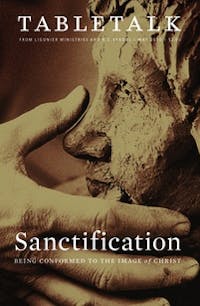
Request your free, three-month trial to Tabletalk magazine. You’ll receive the print issue monthly and gain immediate digital access to decades of archives. This trial is risk-free. No credit card required.
Try Tabletalk NowAlready receive Tabletalk magazine every month?
Verify your email address to gain unlimited access.
Homosexuality has embraced our culture and our culture has embraced homosexuality. It’s part of the fallen nature of things, and fallen man has always been an expert at creating ingenuous ways to celebrate his brokenness.
Homosexuality is one of those topics that draws vibrant reactions. Complex issues of the heart usually do. Christians are in a sort of no-man’sland here. Suggesting that homosexuality is sinful can appear, to the world, as uneducated, rude, and stupid. On the other hand, suggesting that God loves and forgives sinners who struggle with homosexuality and that we should do the same may appear compromising and wishy-washy.
While we can oppose the advancement of this movement by vocalizing our concerns and participating in the political process, for the Christian a far deeper response to homosexuality and the gay community is needed. In such a heated debate, Christians have a responsibility to represent Christ to a fallen world in four ways.
Patiently Listen: “Let every person be quick to hear” (James 1:19). I don’t mean just to look for loopholes or a chance to criticize or find fault. We must listen so as to get to or gain the “heart thrust” of what a person is saying. This is hard work and an art—a skill to be learned. It’s not natural. It takes practice. Listen to what moves other people. Listen for where their passions lie, what they value, what their experience has been (especially with other Christians), and what they fear.
The more you understand a person’s point of view, the more you can profit from it. Why do they think that way? What events led up to their adopting that worldview? What’s been their experience of Christianity—of other Christians or the church? What wounds from their family of origin and from other people lie festering in the background? As adults, we’re usually a composite of all this.
Personally Repent: “Do you think that these Galileans were worse sinners than all the other Galileans? . . . No, I tell you; but unless you repent, you will all likewise perish” (Luke 13:1–5). Only a redeemed sinner, knowing he stands condemned apart from Christ, can reach a sinner who doesn’t know he needs redeeming. What’s your motivation? Is it to reach lost people with the enduring love that has found you out—that has exposed you as a cut-throat and depraved sinner? Is it your own awareness that, at heart, you’re a sham, misfit, counterfeit, and phony? Or is it to make a nice, neat little package of this messy aspect of life? Are you concerned about making a complex world seem simple? Where are you walking in hypocrisy? Do you really care about homosexuals—or only want them to shut up and disappear? Luke 7:47 says that “he who is forgiven little, loves little.”
Gently Instruct: “The Lord’s servant must not be quarrelsome but kind to everyone . . . correcting his opponents with gentleness” (2 Tim. 2:22–25). Is the Holy Spirit instructing us as we seek to instruct others? Do we pray for Christlikeness as we seek to correct others? Are our unloving and impatient hearts a hindrance to the gospel message? It should always be the truths of Scripture, not our demeanor or presentation of it, that people reject.
Talking to those who are blind to the reality of their hearts but who live in a world that applauds their sin is both a privilege and a challenge. They are victims of their own sin and the lies and sin of others; therefore, they’re caught. But they’re also accountable before a holy God. We must represent both aspects of the truth as we share Christ.
Mercifully Pursue and Then Engage the Heart: “Have mercy on those who doubt; save others by snatching them out of the fire; to others show mercy with fear, hating even the garment stained by the flesh” (Jude 22–23). God calls us to be neither reclusive nor rude, but to move boldly into confusing, high-stakes situations with the gospel of God’s mercy. We bring the gospel where it is most needed: to the vocally anti-Christian progay activist; to the mild-mannered clergy who says the love of Jesus means affirming homosexuality as God’s gift; to the quietly confused and scared teenager who fears he’s gay and there’s no other option. Showing mercy means practically caring for people. It means being patiently and persistently available to help those who live in a fallen world.
As we do this, we’re able to move into other people’s worlds. Engaging people by asking good questions, respectfully, is an important part of this. I once stopped a protester who was marching at a gay rally and subsequently had a two-hour conversation that ended with this man thanking me for stopping him to speak with him—in spite of the fact that I shared the gospel with him! I listened and engaged his heart, and that was infectious to him. Listening, asking questions, and engaging people with respect, even if we have fundamental differences, gets people into their story quicker than anything else.
Jesus was the master of all that I’ve just spoken about (though He was in no need of repentance). We should be too. His methods are the most under-utilized and missed aspects of evangelism.
